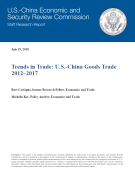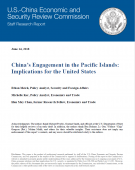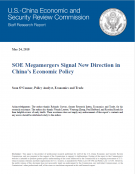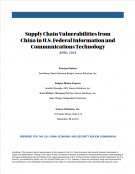Research: Economics and Trade
Research

Since joining the World Trade Organization in 2001, China has leveraged relatively cheap labor, large economies of scale, industrial policies, and the manufacturing capabilities of neighboring countries to become an export powerhouse in an increasing range of industries, while often limiting market access for foreign products. China’s scale as a trading power coupled with its protectionist policies have contributed to rising tensions in bilateral trade relations. This report describes and analyzes patterns in the U.S.-China trade relationship in 2012–2017 and is an update to a staff research report published by the Commission in November 2012 which covered trends in trade in 2000–2011.
Research

Since President Xi took office in 2013, Beijing has significantly bolstered its involvement in the Pacific Islands region, which comprises three U.S. territories and three countries freely associated with the United States that are important for U.S. defense interests in the Indo-Pacific. Much of China’s engagement in the region has focused on expanding economic ties with the Pacific Islands, but it has also increased its footprint in the diplomatic and security realms. This report examines China’s interests in the region, its comprehensive engagement in the Pacific Islands, and the implications of its expanding presence and influence for the United States.
Research

The Chinese government is seeking to revamp its state sector through a series of billion dollar “megamergers” involving central state-owned enterprises (SOEs). These megamergers consolidate state control in strategic sectors of economy and eliminate intra-state competition in China. However, they also contribute to increased debt levels among Chinese SOEs and undermine the competitiveness of U.S. businesses and other global firms. This report assesses the objectives of China’s megamergers strategy and evaluates the implications of SOE megamergers (and, more broadly, Chinese government control over the economy) for the global competitive landscape.
Research

China’s digital game market has emerged as the largest in the world but remains heavily restricted to U.S. game companies. U.S. companies are required to license their games to Chinese operators who appear to claim a majority of the revenue a U.S. game earns in China. Intellectual property rights conditions in China create significant challenges for U.S. firms, facilitating piracy in other international markets through China’s manufacture of piracy-enabling devices and restricting the commercial viability of certain gaming genres and platforms within China due to widespread piracy. Chinese companies have acquired several foreign game companies, raising data privacy concerns given the power of the Chinese government to request information from domestic companies and the broad array of data that can be collected by mobile games.
Research

The U.S.-China Economic and Security Review Commission released a report entitled Supply Chain Vulnerabilities from China in U.S. Federal Information and Communications Technology, prepared for the Commission by Interos Solutions, Inc. The report examines vulnerabilities in the U.S. government information and communications technology (ICT) supply chains posed by China, and makes recommendations for supply chain risk management.
